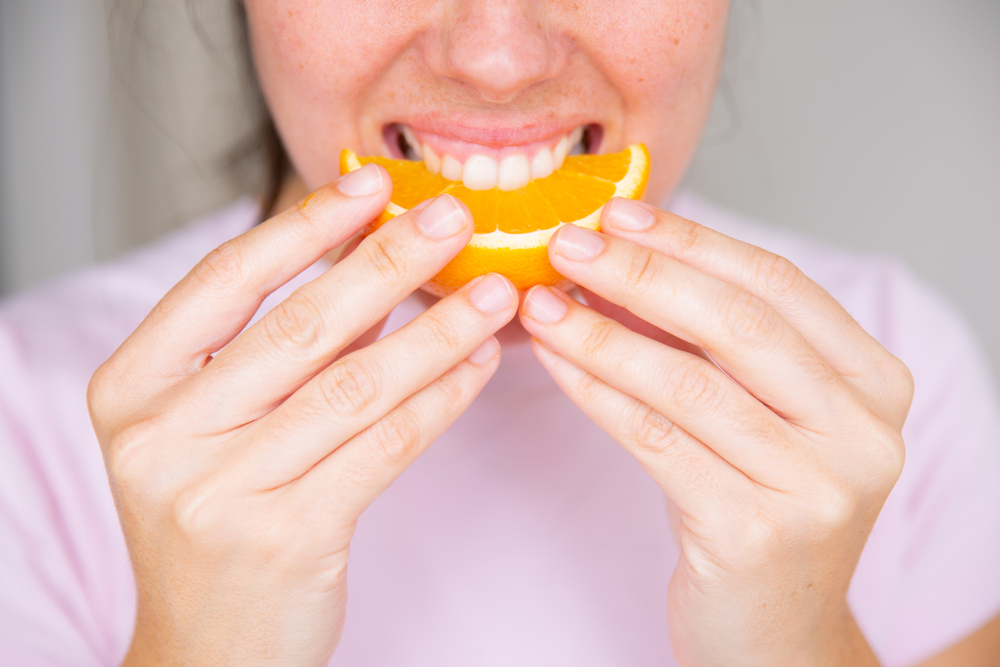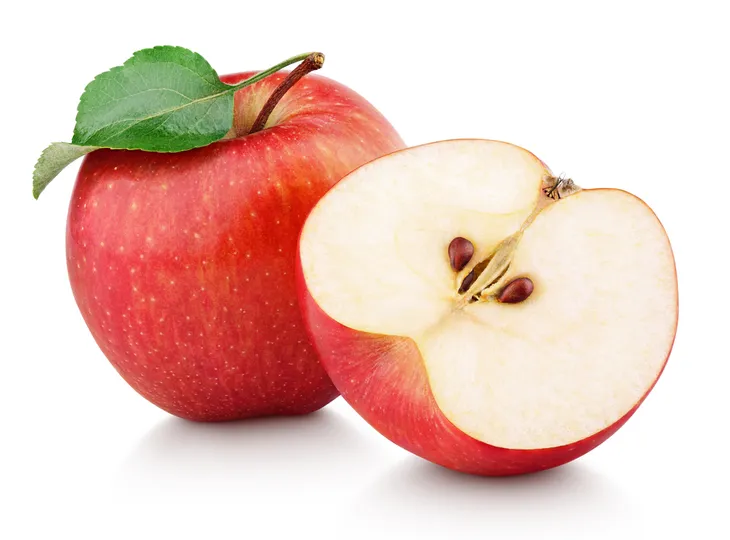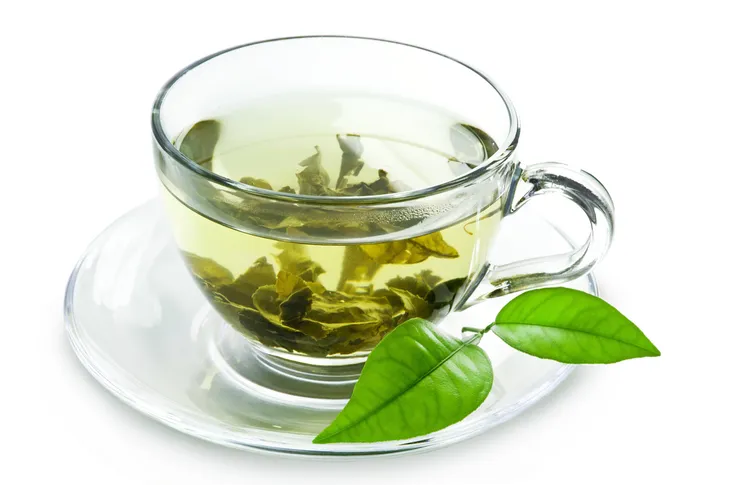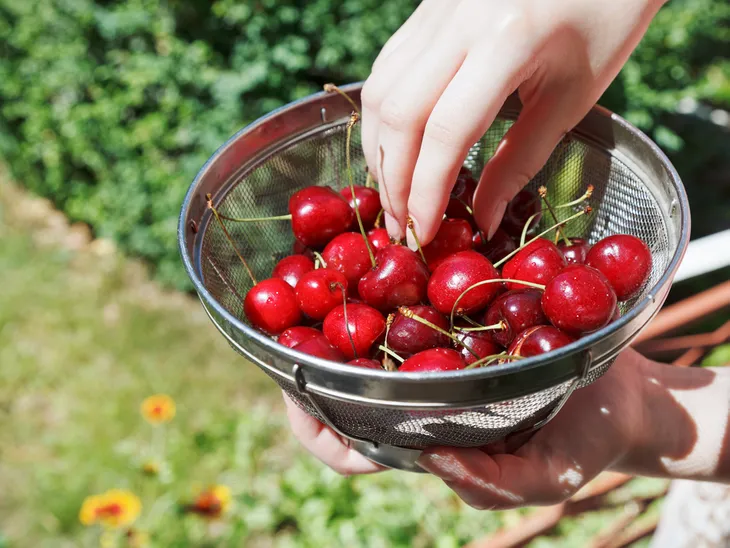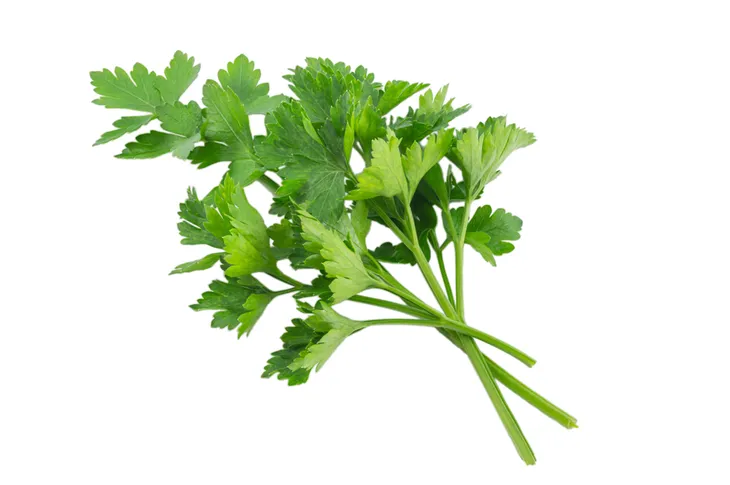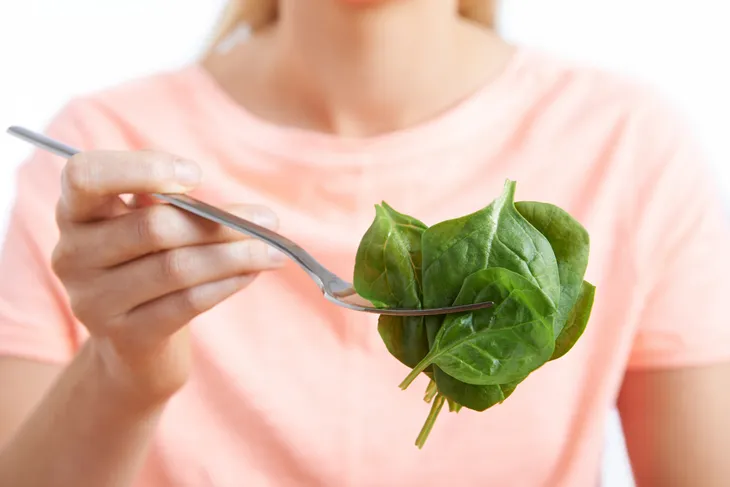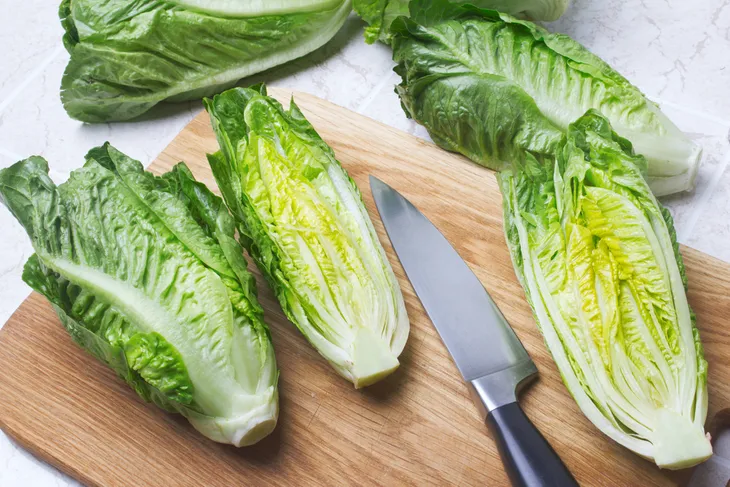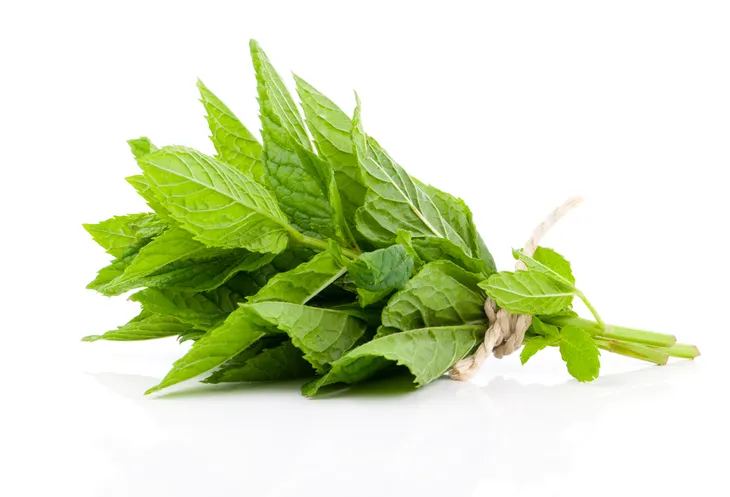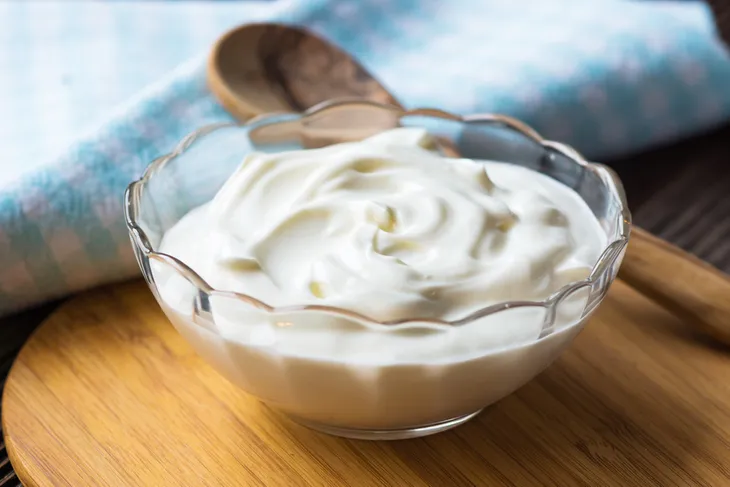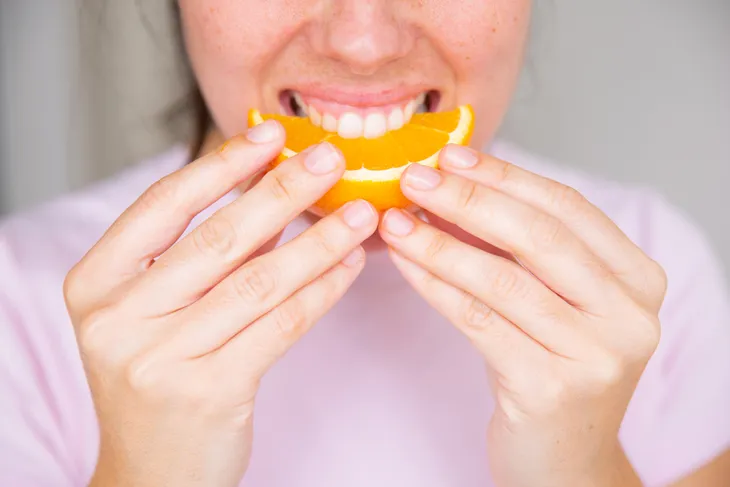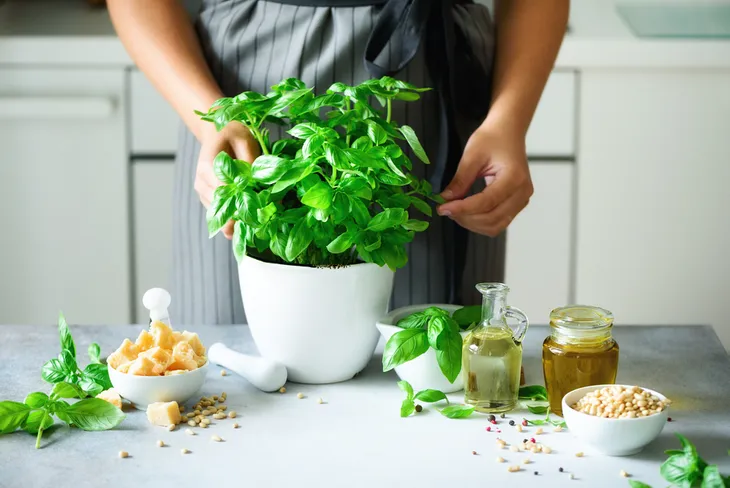Did you eat a particularly garlicky slice of pizza at lunch? Well, I hate to be the bearer of bad news, but that breath mint or piece of gum isn’t going to cut it. In fact, even if you brush your teeth and gargle with mouthwash, you’re merely covering up the foul stench of your last meal.
Bad breath is caused as methyl mercaptan gas builds up in the mouth. This occurs until food is fully digested. Dry mouth and food bacteria are also culprits of bad breath. However, the good news is that you can blast the foul odor, just by eating right. Here are 11 foods that banish bad breath…
Water
Have you ever wondered why your mouth feels stick, parched, and foul smelling prior to a large meal? You’re likely in need of water. Hydration does a lot of great things for the body. Drinking water aids digestion, by flushing food through the digestive system more efficiently. Water also helps purge your mouth of excess debris that can stick to your teeth and tongue and cause bad breath.
A dry mouth full of food particles is a haven for foul breath bacteria are anaerobic, but drinking water cleanses them out! So the next time you devour a half a garlic pizza, try to cleanse the mouth of that lingering odor by having a big glass of water. It may also prevent indigestion and help prevent you from developing excess plaque and cavities too.
Apples
An apple a day will banish foul breath if you eat an apple after that garlicky pizza or pasta dish. In fact, a study conducted by researchers at Ohio State University’s department of food science and technology, discovered that eating an apple was particularly effective in banishing bad breath and even “deodorizing’ the enzymes in garlic.”
This is due to the high amount of polyphenols in apples, these compounds are able to break down the pungent compounds in garlic and literally “deodorize” the pungent taste and smell that sometimes linger after a particularly garlicky meal. Researchers speculate that because apples are also fairly acidic, the high acidity levels of a raw apple may also help the deodorizing of foul smelling foods.
Green Tea
Yet another health benefit of green tea—it contains polyphenols (a type of antioxidant) that prevents the growth of bad breath bacteria. According to a study from Israel’s Institute of Technology, the powerful polyphenols, a type of antioxidant, in green tea blasts bad breath, foul odor, and also prevents tooth decay, and even wards off the development of mouth cancer thanks to the ability to destroy a number of icky compounds in the mouth.
The so-called ‘superfood’ is already credited by several scientific studies for lowering cholesterol, preventing Parkinson’s disease, cardiovascular disease, and Alzheimer’s disease. However, it looks like the powerful green brew also does it’s part to protect oral health, according to research published in the Archives of Oral Biology.
Cherries
Red and juicy cherries are more than just delicious following dinner. The tasty fruit is also credited for blasting methyl mercaptan odors that are emitted from bad breath bacteria. According to nutritional science, cherries banish bad breath by destroying methyl mercaptan odors, a type of stinky gas emitted by the buildup of mouth bacteria.
Research presented by author and nutritionist, David Grotto, who wrote the book, The Best Things You Can Eat, claims that methyl mercaptan destroying foods are able to break down the gaseous odors created by the development of mouth bacteria. In essence, cherries are able to break up gas and help effectively digest bits of food before they create embarrassing breath.
Parsley
Folks have long reached for a sprig of parsley following a particularly stinky meal (think garlic) in order to blast bad breath odors. Indeed, the strong flavor of parsley is a natural deodorizer. However, there is more to this plant than meets the eye. Parsley, gets it’s deep green color from chlorophyll, a compound with antibacterial properties that are actually able to break down sulfur compounds, those that cause bad breath bacteria.
Several studies link parsley to the ability to break down various strains of bacteria that feast on food deposits in the mouth and cause noxious odors. Researchers found that parsley does have an effect on odor, a masking effect, that reduces the overall concentration of volatile sulfur compounds that result in stinky breath.
Spinach
Studies credit the polyphenols in spinach to annihilating smelly sulfur compounds in foods like garlic and onions. Research published in the Journal of Food Science found that spinach was among the foods scientists have found foods that could eliminate the unpleasant, bad breath odors following a garlicky meal. Garlic causes a buildup of allyl methyl sulfide in perspiration and breath.
However, data from the study showed that after eating raw garlic, consuming spinach significantly cut down garlic breath. In fact, scientists believe that spinach acted as a “deodorizing” agent, attempting to break down the enzymes in garlic and naturally freshening embarrassing breath.
Lettuce
Studies show that lettuce also reduces the foul smell of methyl mercaptan, a gas that builds up in the mouth as food is digested. Many food studies credit lettuce with similar bad breath banishing effects as cherries. This is because a few leaves of lettuce are able to break down the smelly chemical, known as methyl mercaptan, that causes bad breath. Methyl mercaptan is emitted when bacteria at the back of the mouth slowly breaks down food particles.
The good news is that eating a few leaves of lettuce following a meal that gives you dragon breath, won’t add to the calories you’re consuming very much. Simply, add a few lettuce chops to your garlicky meals and you won’t have to fear bad breath or weight gain.
Spearmint
Leafy greens that contain high amounts of chlorophyll—such as mint, coriander, tarragon, eucalyptus, rosemary, and cardamom—work effectively as natural breath fresheners. Luckily, that means, according to researchers at the New York University College of Dentistry, that if you eat a particularly breath offensive meal, that spearmint can help mask bad breath. However, the masking is unfortunately only temporary.
Spearmint is likely one of the most well-known ways to banish bad breath for a while. However, offensive odor may come back to haunt you…or your date. Spearmint contains oils that mask bad breath odor. Likewise, spices like cinnamon, parsley, coriander (or cilantro), rosemary, tarragon, and eucalyptus also banish bad breath the same way.
Yogurt with Probiotics
The powerful bad breath fighters in yogurt are due to the active cultures—Lactobacillus bulgaricus and Streptococcus thermophilus—which prevent the build-up of odor-causing hydrogen sulfide in your mouth. Several oral studies claim that the live active cultures within yogurt will act to effectively reduce bad breath. These probiotics (or good forms of bacteria) will ultimately mask the bad, foul-smelling odors emitted by mouth bacteria.
Gerald P. Curatola, DDS, an oral health and wellness expert who’s often a guest on The Dr. Oz Show, claims that the beneficial bacteria in yogurt is able to attack the underlying source of bad breath—the heinous odor-producing bacteria that’s emitted from your mouth as food particles break down.
Citrus Fruits
Oranges, grapefruit, lemons, and limes with high vitamin C content make the mouth adverse to bacterial growth. Several nutrition experts recommend citrus fruit for foul-smelling breath. Consuming a modest amount of citrus fruits, including lemons, limes, grapefruit, or oranges following a stinky meal or when your mouth is dry will help mask bad breath odor.
The reasoning is that the citric acid present in citrus fruits stimulates saliva glands in your mouth. With increased saliva production, odorous causing mouth bacteria will be flushed out. In addition, one can’t overlook the tangy and pungent taste of citrus fruits. like grapefruits, lemons, and limes. Not only does it banish bad odors, but also leave a lively, fresh smell and taste in your mouth.
Basil
Don’t worry about skipping the garlic and onions if you’ve got basil on hand! It’s rich in garlic-breath-fighting benefits of polyphenols, particularly if consumed during the same meal…garlic pesto sauces anyone? In fact, combining garlic and basil is a good way to enjoy a garlicky meal while cutting down on the offensive after effects that can follow you around for hours after your meal.
Bad breath is inevitable in your lifetime, you’ll likely have it at the most embarrassing times, and there’s no miracle cure-all food that will banish halitosis for good. However, saliva producing foods and actions, like munching on basil leaves, can do wonders for the breath, and counteract the foul smell that is produced by bacteria in your mouth. The chewing action will also scrape away plaque (food particles) that causes chronic halitosis and gingivitis.
For more diet and health articles, check out:
